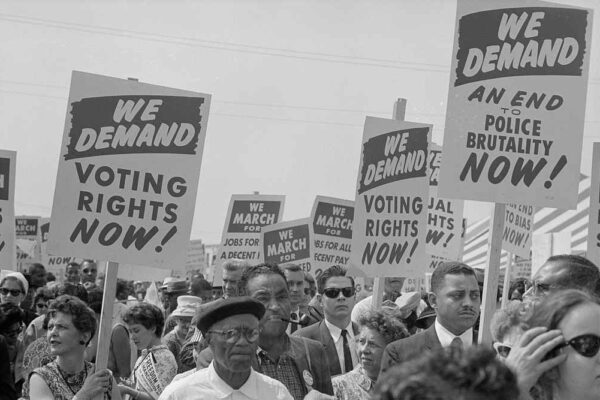Today the Supreme Court is set to hear Milligan v. Merrill, a case that threatens the Voting Rights Act (VRA) and could reshape our country’s future elections.
LISTEN: How the Supreme Court Could Silence Black Voters
The case challenges Alabama’s congressional maps, arguing they are racially discriminatory against Black voters in violation of Section 2 of the VRA. A lower court agreed. Voting rights are now on the line for the whole country as the case heads to the Supreme Court on appeal. A decision in favor of Alabama would uphold racially gerrymandered maps that dilute Black Alabamians’ voting power.
The VRA was created precisely to prevent that kind of manipulation of district lines to undermine the voices and power of Black people. The law is as crucial to fair elections today as it was when it passed in 1965. A ruling in favor of Alabama could weaken Section 2 of the VRA, making it much more difficult to challenge unfair district maps and other election practices that suppress representation for voters of color.
Alabama and other Southern states have a long history of discriminating against Black voters. Since 2013, when the Roberts Court struck down a different key protection of the VRA, state governments in the South have used voter-ID laws, voter roll purges, racial gerrymandering, felony disenfranchisement laws, and other election changes to suppress democratic participation by Black voters. If the Court weakens Section 2 in Milligan, it will open the door to even more extreme voter suppression efforts.
During Louisiana’s 2022 redistricting session, the state Legislature drew maps that significantly underrepresented Black voters, based on U.S. Census data. The ACLU of Louisiana and coalition partners filed a federal lawsuit, which is now on hold and pending the outcome of Milligan. Our fight for fair maps continues, to ensure that every vote counts, and that voters of color have an equal opportunity to participate in our democracy.
Our democracy rests on the principle that voters choose their leaders, not the other way around. If the Supreme Court allows states to manipulate elections with racially gerrymandered maps, and further undermine the VRA, politicians could be empowered to strip even more of our fundamental rights without fear of electoral consequences. A decision in Milligan v. Merrill is due by June of 2023.
LIVESTREAM THE AUDIO OF THE ORAL ARGUMENT ON TUESDAY, OCT. 4TH AT 9:00 AM CT


